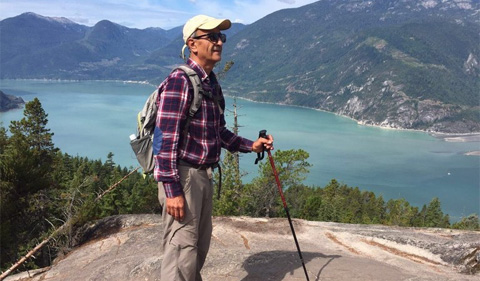Ohio University alum Kavous Seyed-Emami ’75, ’76M died in an Iranian prison in January, shortly after he was arrested on espionage charges.
Earlier this year, Iran’s largest public protests since the Green Movement in 2009 were met with swift response and hundreds of arrests by the Iranian government.
An Iranian-Canadian environmentalist and professor at Tehran’s Imam Sadegh University, Seyed-Emami was arrested on Jan. 24, his son reported on Instagram.
Seyed-Emami earned a bachelor’s degree in Sociology from the College of Arts & Sciences and a M.A. in Development Studies from the Graduate College at OHIO.
“Seyed Emami, was one of the founders of the Persian Wildlife Heritage Foundation, Iran’s most prominent nongovernmental organization focused on the environment,” reported The New York Times on Feb. 10. “The death of Mr. Seyed Emami is among a number involving recently detained activists. Prison authorities insist that at least three prisoners who died after they were arrested during nationwide protests in December also died by suicide. Many prominent Iranians have assailed that conclusion.”
The Center for Human Rights in Iran reported “Clear Signs of State Cover-Up in Prison Death of Iranian-Canadian Academic in Iran” on Feb. 12. “Claims that Seyed-Emami’s death was a suicide have no credibility whatsoever. This is a prison system out of control and a Judiciary that is actively colluding in a massive cover-up,” said Hadi Ghaemi, the center’s executive director.
Other environmentalists and members of the Persian Wildlife Heritage Foundation remain in prison, the center reports.
“With his Canadian passport, gotten as many Canadian-Iranians had in the 1980s and 1990s, he could have lived in Canada. But he chose to stay in Iran and work for change here,” reported the New York Times.
In his classes and through the foundation, he urged his fellow Iranians to work within the system to build the country they desired, despite setbacks they might experience. But lately some authorities clearly found his work at the foundation, which had continued for nearly nine years, suspicious.
As part of its preservation of endangered species, the foundation had set up camera traps to track rare animals like the Persian leopard in the wild. Those cameras, as well as the foundation’s frequent invitations to foreign experts, would figure in the spying charges.
The Arab News reports that leading academics in Iran wrote to Iranian President Hassan Rouhani “demanding answers over the alleged ‘suicide’ of a revered environmentalist in prison.”
“The news of the death of Dr. Kavous Seyed Emami has astounded and shocked the scientific community and the environmental activists of the country,” wrote a group of four academic societies in an open letter to the president.
“In addition to being a well-known professor, a distinguished scientist and war veteran… he was a noble and ethical human being,” the letter said.
After college in the United States, Seyed Emami “returned to Iran and took part in the student uprisings that ended the U.S. sponsored regime of the Shah. He took part in the liberation of government buildings in Teheran and was one of the students that liberated the Savak prisons and torture chambers. It was a horrific experience to see what had been done in these prisons and this sight affected Kavous for the rest of his life,” according to his obituary, which details his service in the Iranian army and the development of his environmental activism. “Kavous felt that his duty was to bring an awareness of and love of Iran’s wilderness and wildlife to a generation of Iranians. He believed firmly that this would promote the preservation of these elements of Iranian experience.”
‘Iran Finally Let Her See Her Husband. He Was Dead.’
A New York Times story on Feb. 22 was headlined “Iran Finally Let Her See Her Husband. He Was Dead.”
TEHRAN — When the call finally came, Maryam Seyed Emami’s heart leapt. Except for one brief phone call, she had heard nothing from her husband, Kavous Seyed Emami, a professor and prominent environmentalist, since he was arrested and accused of spying more than two weeks before. Now, she was being told to come to the offices of the Tehran prosecutor, where she could see her husband at last.
She rushed off, but upon arrival quickly sensed that something was wrong. Instead of being taken to see her husband she was closeted in a room with a prosecutor and four intelligence agents from the Islamic Revolutionary Guards Corps and interrogated for several hours. Cooperate, they told her, or you, too, will end up in prison.
In recounting the experience for their two sons, Ramin and Mehran, Ms. Seyed Emami said that the agents had asked about the couple’s friends and parties they had attended. They showed her family pictures and asked her to describe who and what were in them. They inquired about her husband’s environmental work, she told her sons. Did you know, they asked at one point, that he was a spy?
When the agents finally ran out of questions, she was informed she could see her husband. There was just one thing, they said. He was dead, having committed suicide in his cell.
“They should have built a statue to him, not let him die in prison,” Ramin, 36, a well-known singer in Iran who appears under the stage name King Raam, said in a lengthy interview. He and Mehran, 34, said they decided to ignore warnings from the interrogators and speak out in the hope of pressing the authorities to be more forthcoming about what had really happened to their father and to other prisoners who have died recently under mysterious circumstances in Iran’s prisons….
Read the entire story in the New York Times.




















Comments